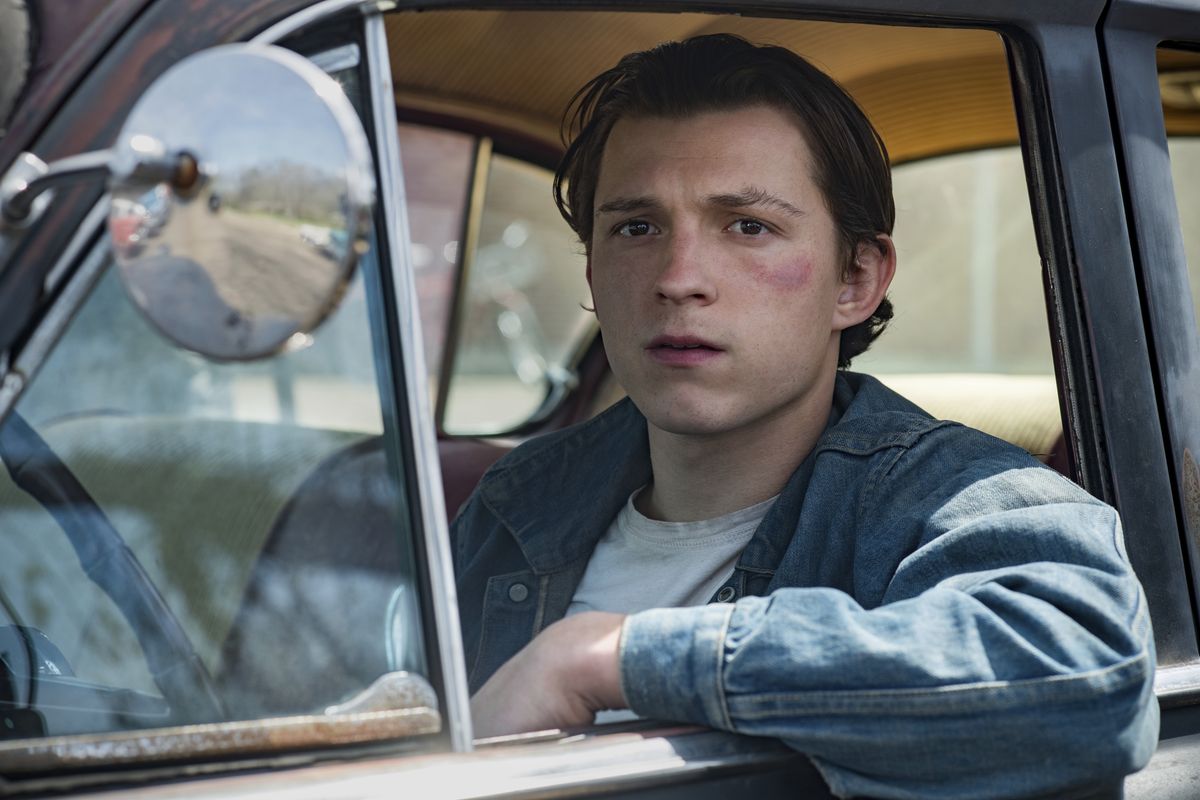Review: ‘Devil All the Time’ a moody journey into heart of humanity’s darkness

It’s the sonorous narration that grabs you at first, a voice lush and resonant with time and place, warm, yet almost ominous, recounting a tale set in Knockemstiff, Ohio, and Coal Creek, West Virginia, back in 1957. This is the voice of author Donald Ray Pollock, of Knockemstiff, who worked at the local paper mill until age 50, when he decided to enroll at Ohio University to earn a degree in English. He sold his first short story collection, “Knockemstiff,” in 2008, before his debut novel, “The Devil All the Time,” came along in 2011. This is his yarn, and he recounts the bone-chilling events within it beautifully.
Pollock’s voice is the guiding light through the film adaptation, directed and co-written by Antonio Campos, and his authorial voice is the discovery that’ll knock ya stiff. “The Devil All the Time” is a gooey slice of Appalachian noir, and Pollock tears the lid right off the pie that is 1950s small-town Americana: cute waitresses, church picnics and crooner tunes (and white, heteronormative, patriotic, pious). Underneath the golden exterior, he exposes a lurid world of murder and mayhem. Sticky red pie filling sure does look a lot like blood, after all.
The world Pollock reveals is ruled by lust, death, violence, war and religious fervor. From this soil is borne Arvin Russell (Michael Banks Repeta, then Tom Holland), son of Willard (Bill Skarsgard) and Charlotte (Haley Bennett), grandson of Emma (Kristin Griffith), stepbrother of sorts to Lenora (Eliza Scanlen). Arvin’s young, terrifying life is about to thrum with near-constant tragedy.
Campos lets Pollock do the talking, and his cinematic storytelling follows suit. Pollock’s conversational style mimics oral storytelling and small-town gossip, jumping forward and ahead in time, flashing back seven years or three months, giving away the ending before the story’s been told. Campos follows this rhythm, finding a mesmerizing and foreboding flow, aided in part by an uneasy, anticipatory score by Danny Bensi and Saunder Jurriaans. It’s a tightly wound, messy, moody odyssey into the heart of humanity’s darkness, with Pollock leading the way.
“The Devil All the Time” is an interconnected tale that spans from 1957 to 1965, give or take, following the life of young Arvin and the corrupt characters he orbits and collides with, from nefarious preachers to dishonest cops and killers roaming the countryside. Inhabiting the cursed characters is a murderer’s row of talent. Arvin is a meaty role for Holland, who gets to explore the dark side of the only honorable man in the bunch. Jason Clarke and Riley Keough, each always simultaneously sinister and seductive, make for a terrifying twosome, while Skarsgard is unforgettably haunted as a WWII vet who can’t shake the horrors he witnessed in the South Pacific. The only bum note in the whole ensemble is Robert Pattinson as the lecherous Rev. Teagardin. Pattinson makes a big, bold choice, but in his performance, he takes “audacious” a hair too far and wanders right into “terrible” territory.
It is in many ways a damning indictment of religious mania that supplants common sense and self-preservation. There’s a tinge of the feverish and obsessive in every horrifying action, men driven by their own demons, in whatever form they take: bad memories and even worse desires that threaten to repeat and recycle themselves. “The Devil All the Time” is a tapestry of inherited traumas, the story folding in on itself, again and again, any loose end braided back into the weave. It’s a stark but masterfully told reminder that the past is always close at hand and inextricably intertwined with our destiny.